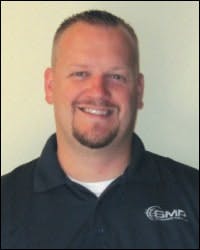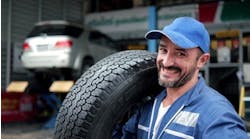For 18 years, Ryan Kooiman worked in independent repair shops, mostly as a technician and shop foreman. And for 18 years, he always had the same desire to “know how everything worked.”
“That really drove me to seek out training,” he says. “I just had this passion to seek out as much training as possible.”
That passion led to his second career as a trainer. Kooiman founded the West Michigan Repair Society and today works full time as a technician training developer for Standard Motor Products, writing curriculum and giving seminars across the country.
Kooiman sat down with R+W to discuss the importance of training in today’s repair shops and what shop owners can do to ensure their people are as skilled and knowledgeable as they need to be.
How would you grade the knowledge base and expertise of the average technician in the industry today?
I think today, more than ever, there’s a larger gap between the knowledgeable technician and the nonknowledgeable technician. There’s so much more technology applied to the vehicles, so there’s more for technicians to know. The guys who stay on top of it have to work harder to stay on top of it than in years past. And the guys who just throw their hands up in the air are falling further and further behind.
There’s always that core group of people you see attend every bit of training they can get their hands on, and they’re charging forward with it. It’s a passion for them, an internal desire for them to learn more and do better and improve.
Then there are the other guys, where their job is simply a nine-to-five thing, and they’re satisfied coming in, doing a brake job and going home.
Have you seen the industry’s view of training change over the years?
Not necessarily. The industry has always recognized the importance of training as far back as I can remember. There’s always been evening clinics and all-day clinics, weekend conferences, etc.
And it’s a lot of the same people who are taking the stuff now that were taking it 20 years ago. There’s always that core group of people that are serious and passionate about it.
I think what has changed is that in today’s world with the Internet, it’s never been more efficient. There are more options available to technicians.
Just for an example: Here at Standard, we offer evening clinics, and we do about 1,800 of these face-to-face clinics in the evening each year. But we also have online training, our Technician’s Toolbox site, where technicians can go and do a click-to-learn or case study.
There’s a lot more of that stuff available today. We like to say that a technician can now get what they want when they want it.
In the past, you might have had the opportunity to attend an evening clinic or a weekend conference maybe four times in a year. With the options of online training, you can find something to learn every night if you wanted to.
How much training would you suggest shops require or expect of their technicians?
The shop I worked at required every technician to attend at least 20 hours of training a year. I know a friend’s shop in Wisconsin where he rewards his technicians with an additional week of vacation if they achieve 40 hours of training in a year. It’s a little bit of a dangling of the carrot out in front of them.
This isn’t including your certification training, like ASE certifications and things like that. This is going above those basic requirements and bettering yourself as a technician.
There’s so much to learn on today’s vehicles. There’s lots of opportunities, and that’s what’s fun about this industry: When you think you’re getting a good grasp of things and how they work, the technology changes overnight, and there’s something new to learn tomorrow.
Sometimes an incentive is needed for technicians to seek training, but it kind of goes back to that a lot of the guys you see at training events, they seek it out on their own. Those are the people who are going to be successful and get the most out of training.
If a technician doesn’t have that drive for continual improvement, then they probably won’t get that much out of the training.
What would you say to techs that don’t seem to have that drive?
The way I look at it is that if you’re looking for a long career in this industry or want more opportunities in the future, you need to pay attention to training and learning about your job right now and continue with that. This is a field where you better be expecting to be learning continually.
What type of training classes are the most important?
A lot of core, basic training is still very important. It’s very hard to sell a class with “basic” in the title, but I see a lot of people struggle with basic electrical stuff or basic ignition strategies. A lot of these people need to learn the value of how the system works and get a good base for their learning.
Do you feel that technical training is something that can be overlooked when owners are looking for ways to improve their shops?
Very much so. I think a lot of times, especially in a small shop where the owner may be fixing cars and running the front office, he’s in the shop probably 12 or 14 hours a day. He’s burnt out by the end of the day and doesn’t want to go to a training class.
Training is critical to having a successful shop.
When I was working in a shop, the other guys used to give me a hard time because I would be sitting in front of a computer all the time. Still, I was the highest-billing tech in the shop, because I would do a few minutes of research to figure out exactly how a vehicle or a system works before attacking it. It made me very thorough and precise in my diagnosis and made repairs quicker.
The same thing can be done with training. People need to take the time at night or out of work to learn the new techniques and learn the new strategies, and it will make them that much more efficient in their work right away the next day.
What is the most important thing for shop owners to focus on in creating a training system or program for their business?
Make sure it’s well-rounded. It needs to have some theory and operations but also a lot of practical application. I’ve sat through way too many training classes where people are awed by what the guy is saying—it’s some engineer spewing a bunch of facts—but you ask the guys afterwards how it’ll help them fix cars tomorrow and they’re not sure.
That’s part of my personal philosophy with training is to give the people something they can use in the bay tomorrow. Focus on practical application of the knowledge, rather than just the theory. The neat facts to know don’t always necessarily help you fix the cars.
I think as a shop owner, it’s important to have a broad overview of what your technicians are looking at. The shop I recently worked at, everyone specialized in the shop. We were all specialized, but we were all encouraged to go to additional training that wasn’t in our expertise. That makes for more well-rounded technicians but it also helped us to appreciate what the other guy was doing and keep up with all the vehicle technology and not just their area of expertise.
There’s that old mantra that shop owners are afraid to pay for technician training, because he could get the training, quit and go work for the guy up the road. They’re worried about paying for a benefit for the next shop. Well, that’s pretty backwards thinking there. You need to treat the employee right and retain them in your own shop and make them knowledgeable.



